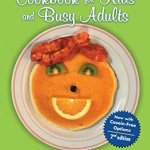Getting children to eat wholesome food is a challenge. Kids know what they like and what they don’t. One thing they don’t like is to be different. What do you do if your child is diagnosed with food allergies or intolerances that will alter his diet – for life?
Something for Everyone
In my family, we deal with Celiac Disease and a gluten-free diet, lactose intolerance, Diabetes and peanut allergies. When it comes to family holidays, we plan our menus with everyone in mind. On our table you will find gluten-free pasta beside whole wheat, lactose free margarine next to the butter and almond milk ice cream chilling with the gelato. There’s always plenty of salad and fruit. When we dine out, we don’t hesitate to speak up in restaurants, or to carry “special” food to impromptu events. Do what you need to do without apology, and make your special eaters feel secure and happy. As you adjust to a recent diagnosis, consider the following.
Being Safe
Today’s parents are lucky because there is a wealth of information at our fingertips. Whether it’s books, websites or support groups, there’s a lot ways to help you understand your tween and find tips on how to communicate with them.
Making Substitutions
It’s hard to find just the right time to talk to your tween. But, you don’t have to. In fact, many times tweens don’t respond well to scheduled talks. Instead, use everyday moments to talk - in the car, at the dinner table or while watching tv.
Showing Optimism
During the tween years, your child’s body will go through many emotional and physical changes. Be sure your child eats right, exercises and gets at least 8 hours of sleep. Parents should also try to stay healthy too. It’s a lot to ask, but it can make a big difference. Think about how much easier it would be to remain patient with a tween on an emotional roller coaster when you are well rested versus when you are sleep-deprived.
Managing Stress
When your child is yelling, giving you an attitude or not saying a word, it can be really difficult not to blow up at them. But, it’s best to keep your cool and stay calm. Remember, you are not always going to agree with what your child has to say. But, it’s important that they feel they are heard
Handling Social Situations
It is not unusual for a special eater to feel deprived, especially when he finds himself in a social situation where there is little or nothing he can eat. Plan ahead and never travel without allergen-free snacks and meals. Make sure your child has permission to go to the restroom and the school nurse as often as necessary.
The New Normal
Having a child with allergies and intolerances that range from mild to life threatening definitely changes a family’s dynamic. Eating at home poses the question of separate meals, parallel meals with substitutions, or allergen-free food for the whole family. Read “healthy” food labels to avoid highly processed and non-nutritive ingredients.
I have two great books to recommend. Each offers useful guidance and recipes to help restrict allergens without compromising nutrition or flavor.
 Cook Book For Kids & Busy Adults >
Cook Book For Kids & Busy Adults >

 to shopping.rememberstuff.me
to shopping.rememberstuff.me
 Love Your Food Again >
Love Your Food Again >


Investigate local and online support groups. Consider forming your own network of local parents to exchange ideas and help your children to grow up strong and healthy.
 to articles.rememberstuff.me
to articles.rememberstuff.me
Remember Stuff for Foodies
Remember Stuff allows you to easily import, save and search your favorite recipes. You can also use it to find great wines, save great restaurants you want to visit, and in many other ways that make your life easier.
